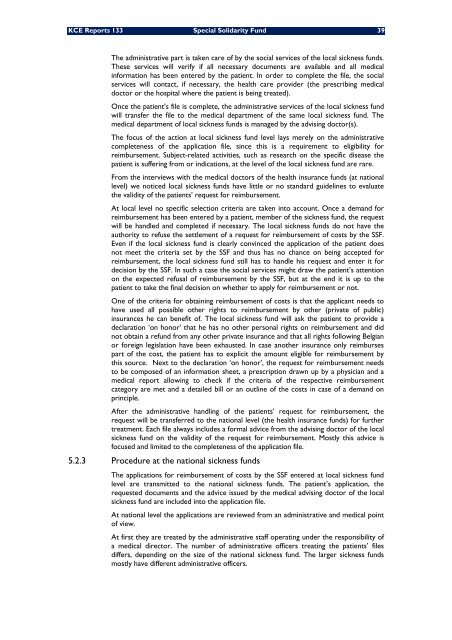Optimalisatie van de werkingsprocessen van het Bijzonder ... - KCE
Optimalisatie van de werkingsprocessen van het Bijzonder ... - KCE
Optimalisatie van de werkingsprocessen van het Bijzonder ... - KCE
You also want an ePaper? Increase the reach of your titles
YUMPU automatically turns print PDFs into web optimized ePapers that Google loves.
<strong>KCE</strong> Reports 133 Special Solidarity Fund 39<br />
The administrative part is taken care of by the social services of the local sickness funds.<br />
These services will verify if all necessary documents are available and all medical<br />
information has been entered by the patient. In or<strong>de</strong>r to complete the file, the social<br />
services will contact, if necessary, the health care provi<strong>de</strong>r (the prescribing medical<br />
doctor or the hospital where the patient is being treated).<br />
Once the patient’s file is complete, the administrative services of the local sickness fund<br />
will transfer the file to the medical <strong>de</strong>partment of the same local sickness fund. The<br />
medical <strong>de</strong>partment of local sickness funds is managed by the advising doctor(s).<br />
The focus of the action at local sickness fund level lays merely on the administrative<br />
completeness of the application file, since this is a requirement to eligibility for<br />
reimbursement. Subject-related activities, such as research on the specific disease the<br />
patient is suffering from or indications, at the level of the local sickness fund are rare.<br />
From the interviews with the medical doctors of the health insurance funds (at national<br />
level) we noticed local sickness funds have little or no standard gui<strong>de</strong>lines to evaluate<br />
the validity of the patients’ request for reimbursement.<br />
At local level no specific selection criteria are taken into account. Once a <strong>de</strong>mand for<br />
reimbursement has been entered by a patient, member of the sickness fund, the request<br />
will be handled and completed if necessary. The local sickness funds do not have the<br />
authority to refuse the settlement of a request for reimbursement of costs by the SSF.<br />
Even if the local sickness fund is clearly convinced the application of the patient does<br />
not meet the criteria set by the SSF and thus has no chance on being accepted for<br />
reimbursement, the local sickness fund still has to handle his request and enter it for<br />
<strong>de</strong>cision by the SSF. In such a case the social services might draw the patient’s attention<br />
on the expected refusal of reimbursement by the SSF, but at the end it is up to the<br />
patient to take the final <strong>de</strong>cision on w<strong>het</strong>her to apply for reimbursement or not.<br />
One of the criteria for obtaining reimbursement of costs is that the applicant needs to<br />
have used all possible other rights to reimbursement by other (private of public)<br />
insurances he can benefit of. The local sickness fund will ask the patient to provi<strong>de</strong> a<br />
<strong>de</strong>claration ‘on honor’ that he has no other personal rights on reimbursement and did<br />
not obtain a refund from any other private insurance and that all rights following Belgian<br />
or foreign legislation have been exhausted. In case another insurance only reimburses<br />
part of the cost, the patient has to explicit the amount eligible for reimbursement by<br />
this source. Next to the <strong>de</strong>claration ‘on honor’, the request for reimbursement needs<br />
to be composed of an information sheet, a prescription drawn up by a physician and a<br />
medical report allowing to check if the criteria of the respective reimbursement<br />
category are met and a <strong>de</strong>tailed bill or an outline of the costs in case of a <strong>de</strong>mand on<br />
principle.<br />
After the administrative handling of the patients’ request for reimbursement, the<br />
request will be transferred to the national level (the health insurance funds) for further<br />
treatment. Each file always inclu<strong>de</strong>s a formal advice from the advising doctor of the local<br />
sickness fund on the validity of the request for reimbursement. Mostly this advice is<br />
focused and limited to the completeness of the application file.<br />
5.2.3 Procedure at the national sickness funds<br />
The applications for reimbursement of costs by the SSF entered at local sickness fund<br />
level are transmitted to the national sickness funds. The patient’s application, the<br />
requested documents and the advice issued by the medical advising doctor of the local<br />
sickness fund are inclu<strong>de</strong>d into the application file.<br />
At national level the applications are reviewed from an administrative and medical point<br />
of view.<br />
At first they are treated by the administrative staff operating un<strong>de</strong>r the responsibility of<br />
a medical director. The number of administrative officers treating the patients’ files<br />
differs, <strong>de</strong>pending on the size of the national sickness fund. The larger sickness funds<br />
mostly have different administrative officers.

















